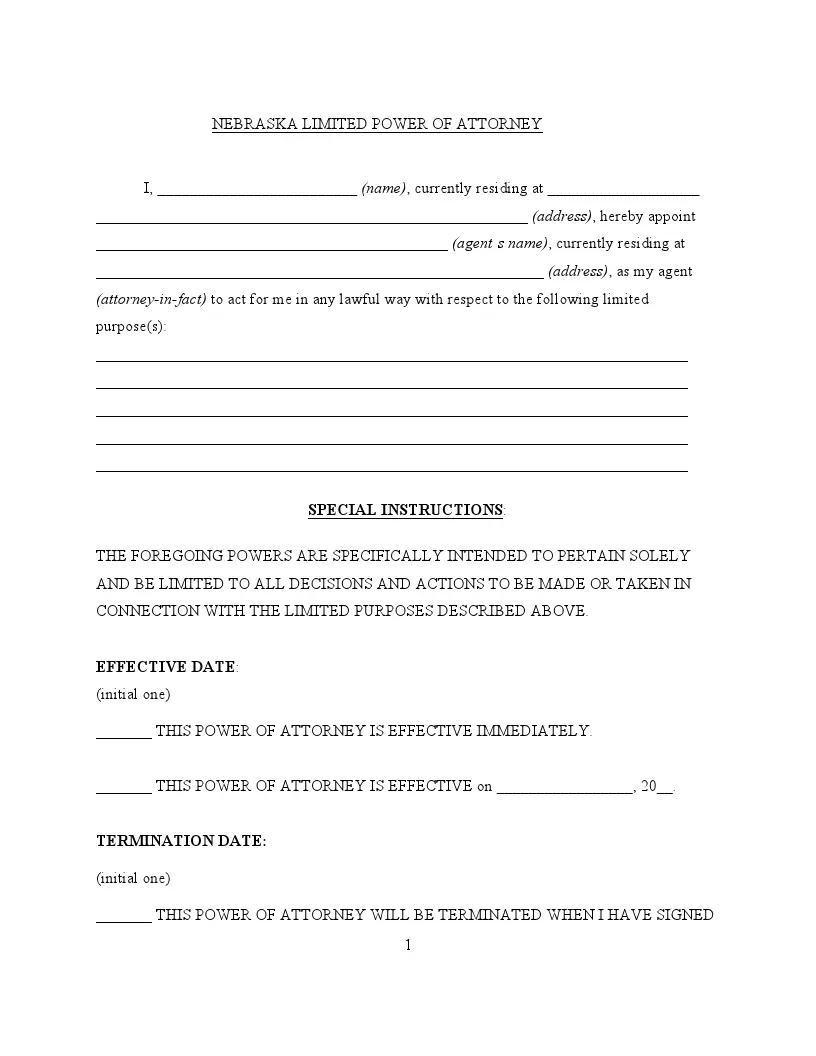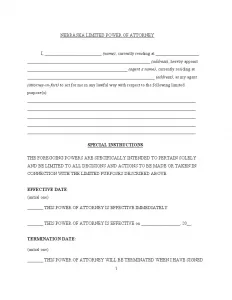Nebraska Limited Power of Attorney Form
A Nebraska limited power of attorney is a legal document that grants someone the authority to act on your behalf in specific matters or situations. The appointed person also called an agent or attorney-in-fact, can make decisions and execute tasks as outlined in the documents. A limited power of attorney restricts the agent’s authority to specific tasks or a set timeframe, unlike a general power of attorney, which grants extensive powers.
For instance, you might use a limited power of attorney to authorize someone to handle real estate transactions, manage financial affairs, or make medical decisions for you, but only under circumstances you’ve clearly defined. This tool is handy when you cannot manage these affairs due to absence, illness, or other commitments.
For those seeking to establish legal representation for personal matters, it’s essential to use the official Nebraska power of attorney forms to ensure compliance with state law.

Build Your Document
Answer a few simple questions to make your document in minutes
Save and Print
Save progress and finish on any device, download and print anytime
Sign and Use
Your valid, lawyer-approved document is ready
In Nebraska, the creation of a limited power of attorney must adhere to specific signing requirements and laws, as detailed in the Nebraska Uniform Power of Attorney Act (§§ 30-4001 – 30-4045). This set of statutes provides the legal framework ensuring that power of attorney documents are executed correctly and accurately reflect the principal’s intentions. The main requirements include:
- As per Neb.Rev.St. § 30-4024, an agent can only exercise powers specifically mentioned in the power of attorney document. It means the principal must explicitly state what decisions the agent is authorized to make on their behalf.
- According to Neb. Rev. St. § 30-4005, the document must be signed in the presence of a notary public. This legal procedure helps verify the principal’s identity and ensures the signature is genuine.
These rules are essential for the validity of a limited power of attorney in Nebraska. They protect both the principal and the agent by clearly defining the extent of authority granted and the conditions under which it is given.
Nebraska Limited Power of Attorney Form Details
| Document Name | Nebraska Limited Power of Attorney Form |
| Other Name | Nebraska Special Power of Attorney |
| Relevant Laws | Nebraska Revised Statues, Section 30-4024 |
| Avg. Time to Fill Out | 8 minutes |
| # of Fillable Fields | 32 |
| Available Formats | Adobe PDF |
Filling Out Nebraska Limited POA
This guide provides a detailed walkthrough on accurately completing the Nebraska limited power of attorney form, ensuring legal compliance and clarity in delegating your authority.
1. Principal Information
Begin by entering your full name and current residential address in the designated spaces at the top of the form. This will identify you as the principal, the person granting the power.
2. Agent Information
Next, specify the name and address of the person you appoint as your agent (attorney-in-fact). This person will be able to act on your behalf under the powers you grant.
3. List Specific Powers
Clearly describe the specific powers you are granting to your agent in the space provided. Be as precise as possible to avoid any ambiguity. It could include managing financial transactions, selling property, or making healthcare decisions.
4. Choose the Effective Date
Indicate whether the power of attorney will take effect immediately or on a future date by initialing the appropriate line and filling in the date if applicable.
5. Determine the Termination Date
Select and initial the condition under which the power of attorney will end. Options typically include a specific termination date, revocation by the principal, or the principal’s incapacitation.
6. Appoint a Successor Agent
If there is a chance that your initially chosen agent might not be able to serve, appoint a successor by entering their name and address. This step ensures that your affairs can still be managed without interruption.
7. Principal’s Signature
Sign the document in the presence of a notary public to authenticate it. Enter the date of signing and print your name below the signature.
8. Notary Acknowledgment
The notary will fill out this section, confirming your identity and the voluntariness of your signing. They will attest to these facts under penalty of perjury, adding their signature and official seal.
9. Distribute Copies
Provide a copy of the signed and notarized document to your agent, any successor agent, and any institutions or individuals requiring proof of your agent’s authority. Keep the original in a safe but accessible place.
